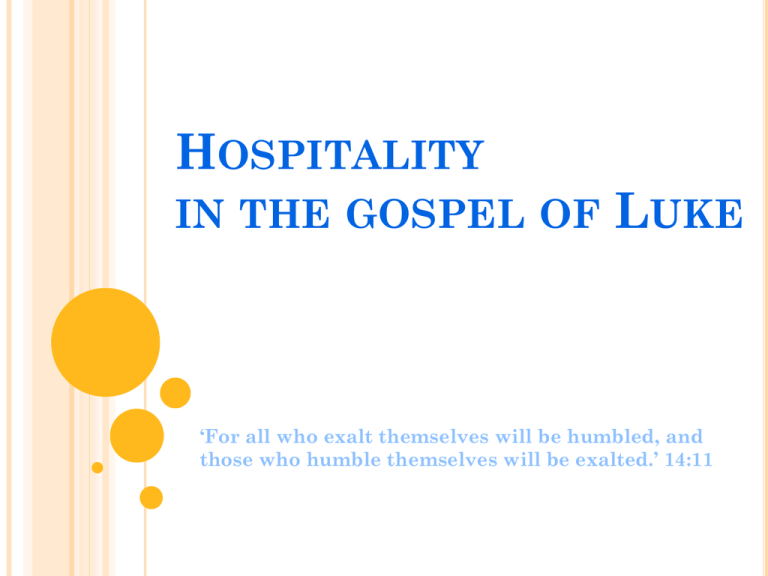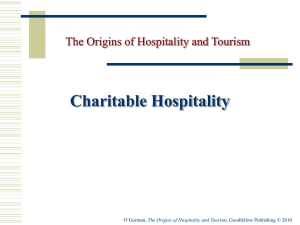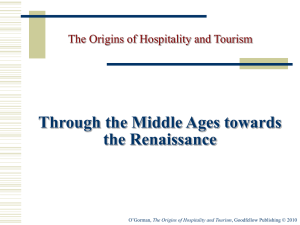HOSPITALITY OF GOD - textsandtraditionsunit3
advertisement

HOSPITALITY IN THE GOSPEL OF LUKE ‘For all who exalt themselves will be humbled, and those who humble themselves will be exalted.’ 14:11 HOSPITALITY: DEFINITION Hospitality can be defined as the act of friendship shown a visitor. Hospitality in the ancient Near East was tightly bound up in customs and practices which all were expected to observe. As in an intricately choreographed dance, where any participant who does not observe his or her own role must either learn it, or leave the dance if the whole is to be jeopardized, so it was with the customs of ancient hospitality. One ignored the customs at one’s own peril. To try to understand those carefully structured and rigidly observed practices in terms of the relative formality or modern Western practices of hospitality would be completely to misunderstand them. HOSPITALITY: STAGES In the ancient Near East, hospitality was the process of “receiving” outsiders and changing them from strangers to guests. Hospitality thus differed from entertaining family and friends. If strangers were not to be entirely ignored, either physically or socially, the reception occurred in stages: 1. 2. 3. Testing the stranger The Stranger as a Guest From Guest to Transformed Stranger 1. TESTING THE STRANGER Strangers pose a threat to any community since they are potentially harmful. Therefore, they must be tested on how they may fit in and whether they will subscribe to the community’s norms. In Luke, the ritual of foot washing marks the movement from a stranger to a guest. This is presented in the story of the Sinful Woman Forgiven (7:36-50) as Jesus sees the woman as a guest, after she cleanses his feet. 2. THE STRANGER AS A GUEST Since transient strangers lacked customary or legal standing within the visited community, it was imperative that they be under the protection of a patron, a host, who was an established community member. In Luke, using the story of the Sinful Woman again, by Jesus accepting the woman, he accepts her into the community, as he is an established member 3. FROM GUEST TO TRANSFORMED STRANGER The stranger-guest will leave the host as either a friend or an enemy. If as a friend, the guest will spread the praises of the host. If as an enemy, the one aggrieved will have to get satisfaction. In Luke, the acceptance of a stranger is shown in many parables, however, the acceptance of Jesus at Nazareth shows how the crowd does not accept Jesus as a guest (the Son of God), and therefore view him as an outcast of society. HOSPITALITY: BIBLICAL CONTEXT Such hospitality was a necessity of desert life. A host was bound at all cost to protect the life and property of his guest, even though previously unknown to him. Hospitality in the ancient world focused on the stranger in need. In the ancient world the practice of hospitality meant graciously receiving an alienated person into one's land, home, or community and providing directly for that person's needs. The Bible places a high value on hospitality and eating, and sometimes banqueting is the focal point of that hospitality. In Genesis 18:1-8, Abraham is the first person shown opening the door of his home in hospitality to others, in this case to the Lord Himself. HOSPITALITY: BIBLICAL CONTEXT Acts of hospitality included: the humble reception of travellers into one's home for food permitting the alienated person to harvest the corners of your own clothing the naked providing food for the needy including the outcast in religious celebrations In the ancient world, to share food with someone was to share life. This is shown through Jesus' meals with tax collectors and sinners (Luke 11:37; 15:1). HOSPITALITY: BIBLICAL CONTEXT- THE O.T. Old Testament teaching identifies the Israelites as alienated people who are dependent on God's hospitality. God graciously received the alienated Israelites and met their needs, redeeming them from Egypt and feeding and clothing them in the wilderness, bringing them as sojourners into God's own land, where God offered them health, long life, peace, and fertility. In a figurative sense, table fellowship is offered during meals of peace offerings and religious feasts where part of the sacrifice is offered to God and the rest is eaten by the sacrificer or community. Indeed, God serves as host to humanity as the one who provides food and clothing for all. EXAMPLES OF HOSPITALITY IN THE O.T Genesis 19:1-10 – a story of Lot. The host is offended, because the ‘guest’ is offended by the community. Proverbs 6:1 – “My child, if you have given your pledge to your neighbour, if you have bound yourself to another…” Deuteronomy 24:19-22 – “It shall be left for the alien, the orphan, and the widow, so that the Lord your God may bless you in all your undertakings.” Leviticus 19:9-10 - “You shall leave them for the poor and the alien.” Exodus 12:48-49 – “ If and alien who resides with you… one native law…” HOSPITALITY: BIBLICAL CONTEXT- THE N.T. Symbolically Jesus came as an outcast figure in a world that did not recognize or receive him. He continues after his resurrection to offer himself as guest. On a literal level, Jesus' itinerant ministry placed him in dependence on the hospitality of others . In his capacity as guest, Jesus bound himself to the lost, sharing table fellowship with tax collector, "sinner, " and Pharisee alike. Jesus equates himself with the needy alienated person. HOSPITALITY: THE EUCHARIST In the institution of the Lord's Supper, Jesus not only serves as host, washing the disciples' feet and directing the meal, but becomes the spiritually sustaining "meal" itself. Identifying himself with the symbolic elements of the Passover meal, Jesus associated his body with the bread of affliction that was offered to all who were hungry and needy, and he associated his blood with the third cup of wine, the cup of redemption. Moreover, by halting the meal before the traditional fourth cup, Jesus anticipates his role as eschatological host, when he will drink again at the messianic banquet celebrating the consummation of the kingdom of God. In appearances after his resurrection, the disciples perceive the identity of Jesus when he takes the role of host. EXAMPLES OF HOSPITALITY IN THE N.T. Matthew 9:10 – “And as he sat at dinner in the house, many tax collectors and sinners came and were sitting with him and his disciples.” Matthew 10:14-23 – “If anyone will not welcome you or listen to your words, shake off the dust from your feet as you leave that house or town.” Mark 5:17 – “Then they began to beg Jesus to leave their neighbourhood.” Mark 6:10 - “Wherever you enter a house, stay there until you leave the place. If any place will not welcome you and they refuse to hear you, as you leave, shake off the dust that is on your feet as a testimony against them.” John 2:10 - “Everyone serves the good wine first, and then the inferior wine after the guests have become drunk. But you have kept the good wine until now.” 1 Peter 4:9 – “Be hospitable to one another without complaining.” Acts 17:7 – “and Jason has entertained them as guests. They are all acting contrary to the decrees of the emperor, saying that there is another king named Jesus.” HOSPITALITY: IN LUKE The approach of hospitality taken in the gospel of Luke, related to the ‘hospitality of God’. There are six main focuses of hospitality: The infancy narratives (Luke 1-2) Mission at Nazareth (4:16-30) The Sinful Woman (7:36-50) Jesus Visits Zacchaeus (19:1-10) Institution of the Eucharist (22:14-20) Walk to Emmaus (24:13-35) Hospitality forms the basis of Jesus’ ministry in the Gospel. Luke sees the whole life and ministry of Jesus as a “visitation” on God’s part to Israel and the world. HOSPITALITY: IN LUKE Hospitality relates to things such as guests, visitors, putting on meals for them, providing a place to stay and making the stranger feel at home. Just as the visitor is welcomed by the hospitality of the host, human beings are called to be hospitable to the Kingdom of God. The One who comes as a visitor and guest in fact becomes host and offers a hospitality in which human beings and, potentially the entire world, can become truly human, be at home, and know the salvation in the depths of their hearts. HOSPITALITY: IN LUKE The story of the tax collector Zacchaeus (19:1-10) is an example of the hospitality of God. Zacchaeus is ostracised from his community because he is viewed as a lying and thieving tax collector. However, he is humble before Jesus and offers him hospitality on his journey. The marginalised one, the “sinner”, is the one who gave hospitality to Jesus, and is therefore offered the hospitality of God. “Today salvation has come to this house, for he too is a son of Abraham”. HOSPITALITY: IN LUKE The questions are raised: How will this guest be received? Who will be welcomed by the hospitality of God? Jesus’ work is constantly being scrutinised by outsiders, who observe and comment. This party (made up of Pharisees and religious elders) have difficulty accepting what is going on, and reject the exchange of hospitality. They contrast the joy and transformation of those who respond positively, like Zacchaeus did. “For the measure you give, will be the measure you get back.” (6: 38) HOSPITALITY: PASSAGES FOR SPECIAL STUDY In the Passages for Special Study, the theme of hospitality runs: first negatively, with a reflection on the coming inhospitality awaiting him in Jerusalem, then more positively, in a series of instructions given in the context of a meal to which Jesus has been invited (The Great Dinner). One of the most common settings for philosophical Hellenistic literature was the banquet. Hospitality in Luke is important, but of course it's not an end in itself. It is shown through Jesus’ time with Martha and Mary (Luke 10:38-41) that hospitality is not ultimately the effort put into the food preparation, but whether or not the food becomes an occasion to really connect with Jesus, and through Jesus, with God. HOSPITALITY: PASSAGES FOR SPECIAL STUDY The shepherds were welcomed by Joseph and Mary, after the birth of Jesus. The sinful woman was recognised as a member of the outcast poor, rejected by the religious elite and untouchable, her acts of hospitality show that she accepts the prophet Jesus. Jesus heals the Man with Dropsy when he is going to share a meal with Pharisees on the Sabbath, showing the hospitality of God to the outcast. In the parable of Humility and Hospitality, Jesus says to his guests who have chosen a higher seat at the table, to sit at a lower one because there is more privilege in being asked to move up the table then down. The parable of the Great Dinner shows the hospitality of the host to strangers, and how he welcomes them into his home. The parable of the Prodigal Son and his Brother, shows the hospitality of the kingdom of God. Even when we sin, we are still accepted into the kingdom if we are repentant. The Burial of Jesus show’s the hospitality of Joseph to give Jesus a tomb for his burial. EXAMPLES OF HOSPITALITY IN LUKE o o o o o o o o o o o o o o o The Shepherds and the Angels- 2:8-20 Healings at Simon’s house- 4:38-42 Jesus Calls Levi- 5:27-32 Blessings and Woes- 6:20-26 Love for enemies- 6:27-36 Judging Others- 6:36-42 A Sinful Woman Forgiven- 7:36-50 A Girl Restored to Life and a Woman Healed- 8:40-59 Would-Be Followers of Jesus- 9:58 The Parable of the Good Samaritan- 10:25-37 Jesus visits Martha and Mary- 10:38-42 Perseverance in Prayer- 11:5-13 Jesus Denounces Pharisees and Lawyers 11:37-54 The Parable of the Rich Fool- 12:13-21 The Faithful of the Unfaithful Slave- 12:41-48 Red= In the PSS EXAMPLES OF HOSPITALITY IN LUKE Jesus Heals the man with Dropsy- 14:1-6 Humility and Hospitality- 14:7-14 The Parable of the Great Dinner- 14:15-24 The Parable of the Prodigal and His Brother- 15:11-32 The Law and the Kingdom of God- 16:14-18 The Rich man and Lazarus- 16:19-31 The Parable of the Pharisee and the Tax Collector- 18:9-14 Jesus and Zacchaeus- 19:1-10 The Parable of the Wicked Tenants- 20:9-19 The Widow’s Offering- 21:1-4 The Preparation of the Passover- 22:7-13 The Institution of the Lord’s Supper- 22:14-23 The Burial of Jesus- 23:50-56 The Walk to Emmaus- 24:13-35 Jesus Appears to His Disciples- 24:36-49 Red= In the PSS











